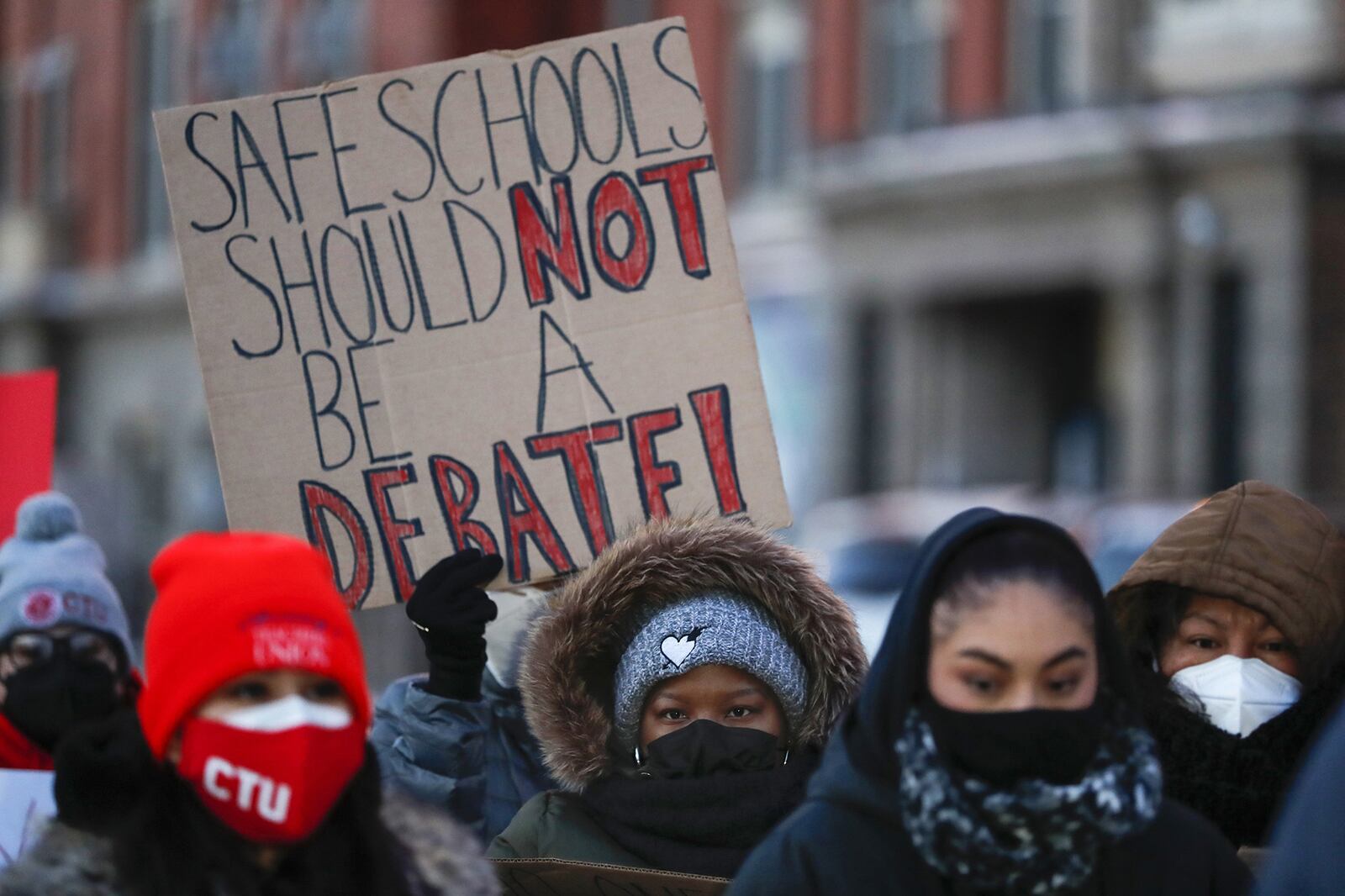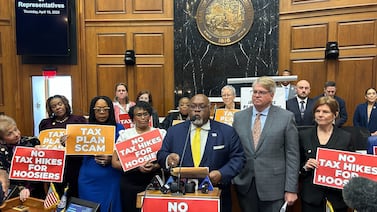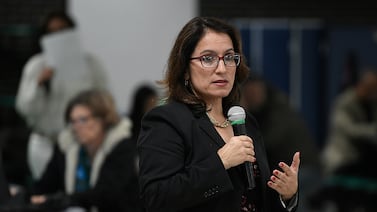Sign up for Chalkbeat Chicago’s free daily newsletter to keep up with the latest education news.
When former Chicago Teachers Union President Jesse Sharkey thinks about the dynamics between City Hall and the union, he flashes back to 2011. That’s when then-Mayor Rahm Emanuel defended a decision to cancel pay raises for teachers by saying they got other types of salary boosts, while “our children got the shaft.”
The stinging quip illustrates how contentious contract negotiations and the relationship between the CTU and city officials were back then, ultimately leading to a weeklong teachers strike in 2012, said Sharkey, who currently sits on the union’s executive board.
After years of thorny relationships with district officials and mayors who did not align with the union on how to improve or support schools, the CTU is expected to begin bargaining this spring over a new contract with a district that now answers to Mayor Brandon Johnson, a former middle school teacher who rose to power as a CTU organizer.
“This is going to be a struggle because the culture in Chicago with the public schools and the teachers union is a culture of ‘No,’ and ‘Make me,’ and ‘OK,’” current CTU President Stacy Davis Gates said during a City Club speech Tuesday. “That’s different from what we are embarking on this time. We’re saying, ‘How might we?’ That’s a different question.”
In a statement, CPS spokesperson Damen Alexander said the district “looks forward to negotiating a fair contract that balances both the interests of the District’s hard-working educators and our duty to be fiscally responsible.”
A City Hall spokesperson declined to comment for this story.
The latest contract talks will come amid massive change for Chicago Public Schools. The first-ever school board elections will take place this fall and a 21-member partially elected board will take office next January. And bargaining will happen as the district attempts to fill a projected $391 million budget deficit for next year, after four years of being buoyed by $2.8 billion in federal COVID relief dollars that will soon run out.
Amid those challenges, the union has a strong ally in office.
The CTU was Johnson’s largest campaign donor, and Davis Gates introduced him at his victory party.
Before the union propelled one of its own into the mayor’s office, the teachers union regained some bargaining power in 2021 when state legislators passed a law that restored its right to bargain over a broader set of issues — such as class size or the length of the school day — which had been restricted since 1995.
Still, Johnson signaled on the campaign trail that he would face “tough decisions” as mayor in negotiations with the CTU and wouldn’t be able to meet all of the union’s demands.
“So who better to deliver bad news to friends than a friend?” he said during a mayoral forum last year.
But the Johnson administration has already overseen policy changes the union counts as victories, including expanded parental leave for CTU members, a promise to remove school resource officers by next school year, and a commitment to rethink school choice policies.
The union’s House of Delegates, made up of hundreds of educators across the city, is scheduled to vote Wednesday on proposals crafted by the union’s various committees and developed as a response to what CTU members said they wanted to see in the next contract, according to the union.
Those proposals include a wide range of ideas, from pay raises and housing assistance for teachers to providing affordable housing and support for homeless students and their families.
While union officials acknowledge that things are different this time around, they have also emphasized that Johnson does not “have a magic wand” and pushed back against the idea that the union will get everything it asks for.
“I think it is ridiculous for anyone to think that the Black man on the fifth floor who comes from the progressive movement has fairy dust to sprinkle to end this quickly,” Davis Gates said in an interview with Chalkbeat last month. “There is an entire bureaucracy that has been hired and trained to tell the Chicago Teachers Union, ‘No.’”
Joe Ferguson, president of Civic Federation, a nonpartisan government watchdog group, said the mayor can’t meet all of the union’s demands because “the money isn’t there for it.” He said the public deserves to hear from the board and the mayor on where they’ll draw the line.
“Where those boundaries are, nobody can say,” Ferguson said.
Past tensions between CTU and City Hall prompted strikes
Over the past decade, contract negotiations between CPS and the CTU have resulted in two strikes that garnered national attention and inspired education labor fights around the country.
In 2012, after months of simmering disagreement and the city skipping a raise for teachers, the union went on strike for seven days at the start of the school year. Emanuel had pushed for a longer school day and embraced education reform ideas sweeping the country at the time, including a new way to evaluate teachers, which the union strongly opposed. He also refused to bargain over issues like class size, which at the time, state law did not require CPS to do.
An 11-day strike happened in 2019 under then-Mayor Lori Lightfoot, who the union had initially expected to align with more than Emanuel. The union was fighting for “common good” ideas that exceeded the scope of a teacher’s daily duties but were meant to improve students’ and families’ lives, such as ensuring that every school had a nurse, social worker, and librarian. The contract ultimately locked in some of those demands, as well as other wins, such as a $35 million fund to help reduce class sizes, but ultimately, the long strike left many teachers and families frustrated.
Those sour dynamics appear to be gone with Johnson’s election, said Robert Bruno, professor of labor and employment relations at the University of Illinois at Urbana-Champaign, who co-wrote a book about CTU’s 2012 strike.
“Both parties believe that the other party understands and would be respectful of each other’s perspectives, which certainly wasn’t the case with the two previous mayors or even the previous CEOs — and we’ve gone through a few of them in Chicago,” he said.
Sharkey noted that Johnson’s priorities include many ideas the union agrees with and gave rise to, such as creating more sustainable community schools that provide wraparound services to families. His campaign platform also closely mirrored a document CTU first put out in 2012 titled “The Schools Chicago’s Students Deserve,” which was updated in 2018 and most recently, in 2022.
In general, the union has found that working with the district has been easier and more receptive since Johnson has taken office, according to Sharkey and Davis Gates.
But Davis Gates said she expects plenty of disagreement because she still feels that the agency has a bureaucracy “that cannot collaborate, that does not say yes, and has a difficult time understanding how to partner with us.”
Union again pushing ‘common good’ demands
The union is expected to push for cost-of-living raises that keep up with or exceed inflation and a more uniform overtime pay policy, according to proposals leaked to conservative think tank Illinois Policy Institute, which a CTU spokesperson confirmed are real. The union also wants changes to the teacher evaluation process, including to codify that evaluations cannot be used for layoffs.
Proposals also include codifying health care policies, such as gender-affirming care, paid parental leave for employees, abortion coverage, and access to weight loss medical care, such as bariatric surgery.
In a more novel demand, the union will also push for housing assistance for its members, but the leaked proposal doesn’t include more details on how that would be done. Under Emanuel, the city offered assistance to police officers who wanted to buy homes in the areas they worked in, but few officers took advantage of the program.
In the classroom, the union is expected to renew a push to give elementary school teachers more preparation and collaboration time during the school day, Sharkey said. That was a major demand in the 2019 contract negotiations that largely did not come to fruition – and could again be difficult to secure this time around given the complicated logistics of tweaking a school day.
Union officials also expect proposals around bilingual services for students, including on attracting staff and expanding access to bilingual training for teachers, and retaining more special education staff. Both bilingual and special education are teacher shortage areas.
Davis Gates said they’ll continue demanding a librarian and nurse be staffed at every school.
Separately, union officials are expecting to push for more common good items, Davis Gates said. This will include creating a career and technical education program that would involve building houses for homeless students and their families, according to the leaked proposals.
Common good proposals will also include creating more sustainable community schools, Davis Gates said. The union is also interested in pushing for more “green” – or energy efficient – schools, such as by installing more solar panels. The district is already planning to purchase 50 electric school buses.
CPS’s budget deficit could complicate negotiations
Contract talks will begin as the district plans for its budget next year, which is projected to be $391 million in the hole. That could make costly union proposals a tough sell for the district.
District officials have for months publicized the budget deficit as federal COVID relief dollars run out. The district can either cut programming or find more money, which officials want to do by demanding more funding from the state.
Bruno, the labor expert, said it is a good sign the union agrees that Springfield should provide more money, because that means all negotiating parties agree on a solution to a significant problem.
However, Ferguson, from the Civic Federation, has little hope that more money is coming, in part because of what appears to be a “frayed” relationship between City Hall and Gov. J.B. Pritzker’s office. Pritzker recently proposed a budget that provides the same increase to K-12 funding as last year. And because CPS’s deficit is driven by the loss of COVID relief dollars, this year’s negotiations are “a fairly unique stew,” he said.
“There have been deficits being faced in the past [and] constraints on funding sources, but none that have come in this particular context, where not only is there a question of, where is more money coming from, but it also comes at a moment when we all know that recent existing streams are going to end,” Ferguson said. “And it has also been made abundantly clear by Springfield, by the governor, that there is no money to be gotten from the state.”
Union officials said they don’t yet know the price tag of their proposals, and they don’t expect to propose “money-saving” ideas. But Sharkey said they’ll have ideas on how the district can fund their proposals “and would expect the board to try to work with us on that.”
Asked how the district’s financial picture will impact its approach to negotiations, a CPS spokesperson pointed to the district’s budget deficit and said the district must be “fiscally responsible.”
Even with financial challenges, Sharkey said he expects the union and the district to work out disagreements in a more timely manner, unlike past negotiations that were “unproductive for months.”
Davis Gates said CTU continues to see its contract as “leverage for the common good,” has “high expectations” for upcoming negotiations, and is hoping for more agreement that will finally deliver on the CTU’s push to get schools more resources.
At the City Club speech this week, in a room full of business leaders, educators, and philanthropists, Davis Gates said she expects people to be skeptical that the mayor is going to “give CTU everything it’s asking for.”
“I hope he does,” she said.
Reema Amin is a reporter covering Chicago Public Schools. Contact Reema at ramin@chalkbeat.org.





